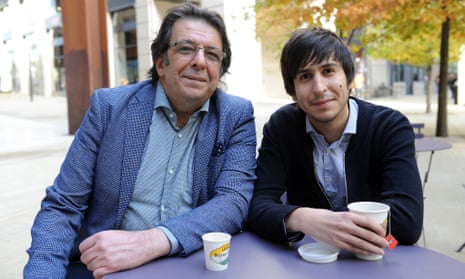A man detained by the police on his way to a holiday in Rome is bringing legal action against Bedfordshire police for breaching his human rights.
Ziad Najm, 56, is from Iraq but has lived in Europe for more than 30 years. He was at Luton airport with his son Tarek, 30, en route to a week-long holiday when they were detained by plainclothes police officers under anti-terrorism legislation.
Their phones were seized and data was downloaded from them. Ziad Najm, a concierge, was fingerprinted and had his biometric data retained.
No reason was given for the detention but the men said they were told by police they had now been added to a list of terrorist suspects and could face further questioning in future.
Najm, who has repeatedly denounced terrorism online since he came to the UK 10 years ago, and who, like his son, has a British citizenship application pending, said the incident had caused him to lose faith in the country.
“I have been vocal in my calls for a tougher stance on Islamic terrorism,” he said. “Why did they stop me when I don’t even believe in religion, while they say they have a list of 23,000 jihadis who are walking freely in this country? Why did they stop me on my way to a holiday in Italy while they didn’t stop jihadis on their way to Syria, Iraq or Libya?”
His solicitor, Anna Mazzola from Bindmans, began legal proceedings on Tuesday to challenge the police’s decisions and their refusal to disclose the basis for those decisions.
In a letter before action, sent to Bedfordshire police, she argued that the officers’ behaviour was unlawful and breached both human rights and data protection legislation.
“I have no idea why we were stopped,” Najm said. “I was held for two hours and Tarek for an hour. We were asked to hand over our phone passwords, which we did. They held our phones for five hours.”
Tarek Najm said: “When I was questioned I was asked what my political views were. I told them that I’m a Guardian reader and that my political views are pretty close to those of the Guardian. I told them that I believe in humanity.”
Najm said he and his son were not Muslim, followed no religion and that he had posted comments on Facebook condemning Islamist terrorism and calling for a tough response from police to deal with the problem.
“I was told that even though they had not found any evidence to link me to terrorism I was now on a list of terror suspects and would remain on that list so they could stop me again and question me again in the future,” he said.
The pair missed their flight and had to book on to another flight the next day. They have been told that the mortgage they were hoping to obtain to buy a flat in London can no longer be processed because Najm is on the terror watchlist.
Najm asked for police to apologise for their treatment of him and his son and for his name to be removed from the list.
A spokesman for Bedfordshire police confirmed the pair had been stopped at Luton airport.
“Together with our partners we do everything we can across the country to tackle terrorism, the safety of our communities is an absolute priority,” he said. “Anyone who has any concerns about the way in which they have been dealt with by our officers is encouraged to submit a complaint to our professional standards department so it can be looked into further.”
Mazzola said the Najms’ case was serious, but not unique.
“This is an example of how schedule 7 amounts to an abuse of state power, and one which turns people against the state … Schedule 7 powers are regularly overused and abused, leaving those who are detained without proper access to information and, often, without a remedy.”
She said the collection and retention of people’s DNA and biometric data without any explanation or justification was of particular concern.








